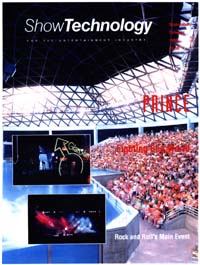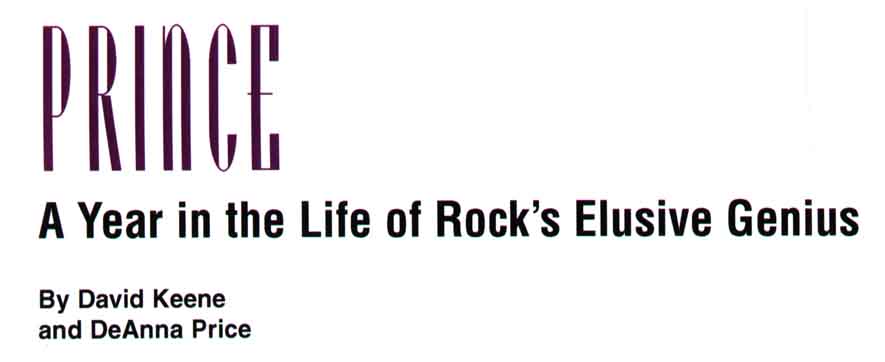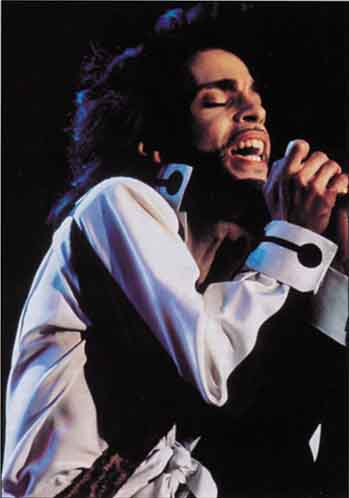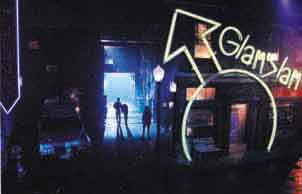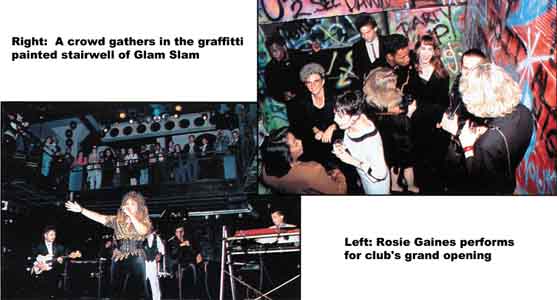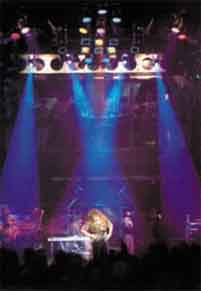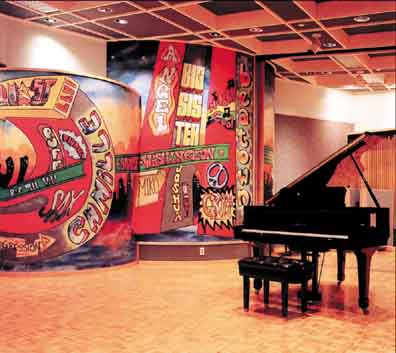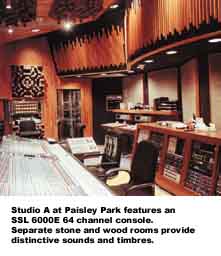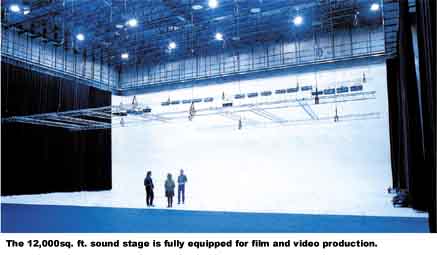|
|
|
|
|
|
|
Driving through the dense red and burnt ochre autumn foliage in
the rolling hills outside Minneapolis, a landscape more reminiscent of Norman
Rockwell's Land of Enchantment than Prince's Purple Rain, it
takes almost a Kierkegaardian leap of faith to believe that this idyllic
countryside, this land of shimmering birch groves, quiet lake retreats and
mom-and pop apple stands harbors the creative mecca for rock-and roll's
perennial Bad Boy. When you reflect on Prince's accomplishments of the past year it
soon strikes you that his rigorous work habits, tireless ambition and guarded
life are not out of place in this country of quiet accomplishment and the
Protestant work ethic. After ten years in the public eye, a period of many
successes and a few failures, Prince has shown himself to be above all a
worker, a trooper. The past year has seen him, at once unafraid of failure
and somewhat penitent about past excesses, rededicating himself to his work
and long-term goals. In the [past years], Prince has written, produced and directed a
movie; recorded a new album; toured Europe and Japan; produced albums for
other Paisley Park artists and generated revenue and an inspiration of a new
Minneapolis nightclub. |
|
|
|
|
|
[With his tour coming to an end, Prince was eager to return home
for] the October 15th opening of Glam Slam, the new Minneapolis
Nightclub named after the fictional club in [the movie] Graffiti Bridge. Owners Gilbert Davis and Ruth Whitney
worked in conjunction with Prince and Paisley Park Enterprises to open the
20,000 square foot club, which promises to the be the anchor of the
Minneapolis Sound and will feature, along with live acts, unreleased Paisley
Park recordings, including Prince rarities.
Prince is also very anxious to have a venue where he can drop by and
try out new material . . . without, as he puts it, "having to jump on
stage with equipment from Dwight Yoakam." |
|
|
The interior design and decoration of the club, housed in a former textile building
built at the turn of the century, is described by club designer Sottera
Tsetter as a mix of "neo classical and gritty industrial." Architect Gordon Olschlager of KKE Architects
worked with Whitney and Davison to exploit the buildings distinctive existing
architectural elements. |
|
|
The materials used for the interior details were simple
industrial look exposed of faux marble, back lit columns and mirrors
compliment the stark design to create a look that is part glamour, part
raw-Industrial...hence the name Glam Slam. The Plush second floor of the cub is reserved for members only,
a privilege for which a select group of clubgoers paid $3,000 each. To make
it worth their while, the second floor concrete floor was cut away at the
center to allow for prime view of the downstairs dance floor and stage. The work of several innovative local
painters and sculptors graces the room, including a large black and white
mural from the movie Graffiti Bridge painted by Tsetter. Steven M. Frattalone
of Frattalone & Associates, Inc. in St. Paul, together with Matt Larson, Glam Slam's technical director and
one of Prince's right hand men at PRN Productions, developed the audio,
lighting and video systems for Glam Slam. Frattalone and his lead technician Michael
Mord completed the installation with the aid of Matt Larson, his lead
technician Paul Froid and a crew of 21 technicians--affectionately known as
the "Noise Boys" from the Minneapolis area. |
|
The club is set up for both live performances and recorded
music, featuring a 1,300 sq. Ft. dance floor with a stage adjacent to one
end. In addition to basic stage lighting consisting of 6 PAR 56 and 66 PAR 64
1K spots, 16 Lightwave Research Color Pro and 16 Intellabeam do double duty
as both stage and dance floor lighting. "We didn't want to use just a
bunch of PAR cans because that can eventually get stale, so we decided to use
color-changing lights and moving lights," said Froid. The heart and soul of it all . . . the
tours, the records, the movies...is Prince's Paisley Park located in rural
Chanhassen outside Minneapolis. The $10 Million dollar recording studio, sound stage and
creative incubator was built in 1986. After only a few years the facility boasts
an impressive list of albums recorded, films shot, and commercials produced.
During the summer of 1989 four of the top 10 albums on the charts were
produced completely or partially at Paisley Park. (The Raw and the Cooked,
Fine Young Cannibals; Like A Prayer, Madonna; Forever Your Girl, Paula
Abdul; and the Batman Soundtrack album.) John Dressel, Recording
Facilities Manager, oversees the three recording studios that are housed at
the facility. |
|
|
Studio A and B consist of high-end equipment and are primarily
used for top acts, film scoring and other high level productions. Studio A
houses an SSL-64 channel 6000E-64 Total Recall automated console; Studer A800
Mark III 24-track and A820 2-track recording machines with the center stripe
time code feature; 48 mono and eight stereo input modules; an SSL event
controller and programmable equalizer, a Sony BVU8000 and XBR monitor
3/4" Video deck with lock-up, Westlake 5-way SM-1 studio monitors
powered by Crown amplifiers, and a whole raft of special effects signal
processing gear, including boxes made by Focus-Rite, Publison, AMS, Eventide
and GML. Adjoining Studio A are the
Granite and Wood rooms, designed to provide different acoustical spaces for
artists to record or practice in the granite walls aid in enhancing digital
recording while the wood room was designed for the acoustics of any
instrument that resonates. |
|
Studio B is a simpler arrangement centered around a custom built
API/DiMedio console with API equalization and Massenburg-GML moving Fader
Automation. Studio C provides recordingfacilities for "alternative"
artists and adjoins a large rehearsal space. Studio C tens to be the busiest
studio, with recording or rehearsal sessions going around the clock. (A
fourth studio is being planned to accommodate the increasing demand of artist
wanting to record at the site.) Recently several major film productions were shot on Paisley Park's sound stage, including a film /HDTV (high definition television) feature called "To Dream of Roses" and "Old Explorers" starring Jose Ferrer and James Whitmore. Several outdoor scenes from Graffiti Bridge and numerous commercial advertising productions were filmed there as well. The 120 X 102 foot sound stage, with a 45 foot ceiling height can load in 2,000 pounds of rigging from any point in the ceiling. The rental inventory of 400 pieces of house lighting equipment includes Matthews grip gear, Ianiro HMIs Skirpan dimmers with Ianiro and Mole/Richardson floods. |
|
|
|
The stage is acoustically tunable and can be patched to any of the three recording studios for live recordings. A set construction shop and a full costume department round out the facility. According to Matt Larson the staff at Paisley Park "creates miracles on a daily basis." Miracles or not, so far hard work seems to have accomplished quite a bit. Given Prince's prodigious output and the talent that he surrounds himself with, we have probably not yet seen the last or even the best of what Paisley Park holds in store for the industry. |
|
This document contains segments extracted from ShowTechnology magazine, a publication for the Entertainment industry. Dated September/October 1990. The ShowTechnology magazine cover logo is the registered logo of ShowTechnology, Inc. |
|
- Links to our other Projects - |
||||
|
Frattalone and Associates, Inc. ˇ Professional Entertainment Systems P.O. Box 14110, St. Paul, MN 55114 ˇ (651) 644-3300 ˇ Fax: (651) 645-6746 E-Mail: Contact-Us@Frattalone.com |
